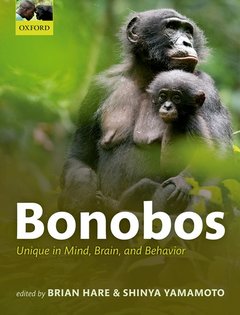Bonobos Unique in Mind, Brain, and Behavior
Langue : Anglais
Coordonnateurs : Hare Brian, Yamamoto Shinya

The bonobo, along with the chimpanzee, is one of our two closest living relatives. Their relatively narrow geographic range (south of the Congo River in the Democratic Republic of Congo) combined with the history of political instability in the region, has made their scientific study extremely difficult. In contrast, there are dozens of wild and captive sites where research has been conducted for decades with chimpanzees. Because data sets on bonobos have been so hard to obtain and so few large-scale studies have been published, the majority of researchers have treated chimpanzee data as being representative of both species. However, this misconception is now rapidly changing. With relative stability in the DRC for over a decade and a growing community of bonobos living in zoos and sanctuaries internationally, there has been an explosion of scientific interest in the bonobo with dozens of high impact publications focusing on this fascinating species. This research has revealed exactly how unique bonobos are in their brains and behavior, and reminds us why it is so important that we redouble our efforts to protect the few remaining wild populations of this iconic and highly endangered great ape species.
Dr Brian Hare is an associate professor of Evolutionary Anthropology and a member of the Center for Cognitive Neuroscience at Duke University in the United States. Since 2007, he has published over two dozen peer-reviewed empirical papers on the cognition, behavior, physiology, morphology, and evolution of the bonobo. He has studied bonobos in zoos, African sanctuaries and in the wild. His research focuses on identifying unique cognitive traits as well as understanding evolutionary processes that produce them. Dr Shinya Yamamoto is an associate professor at Kobe University in Japan. He has published research on both wild and captive chimpanzees. More recently he began studying the behavior of wild bonobos at the Wamba field site in the Democratic Republic of Congo. His research concentrates on the evolution of cooperation, culture, and understanding others.
Date de parution : 10-2017
Ouvrage de 300 p.
20.7x24.9 cm
Date de parution : 10-2017
Ouvrage de 304 p.
20.2x24.7 cm
Thèmes de Bonobos :
© 2024 LAVOISIER S.A.S.



